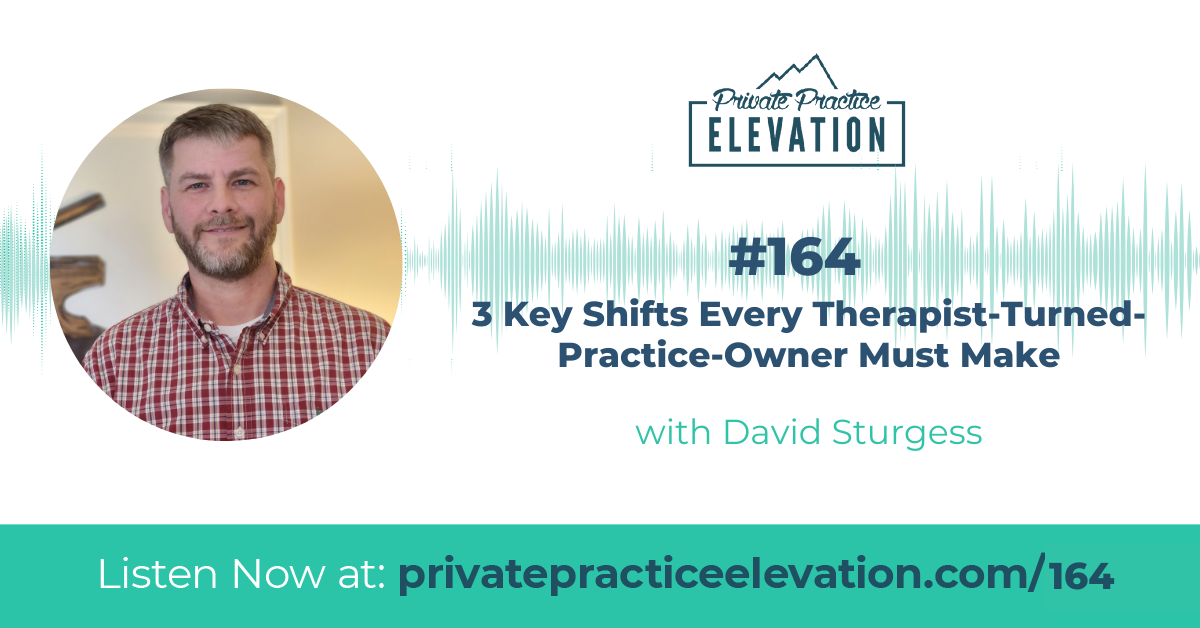In this episode of the Private Practice Elevation podcast, host Daniel Fava welcomes David Sturgess, a seasoned mental health professional and business consultant, to discuss the pivotal shifts required when transitioning from therapist to business owner.
The journey from being an agency therapist or employee to becoming a business owner of your private practice is filled with unique challenges and opportunities.
For therapists considering this path, understanding the nuances of business, the value of time and money, and the intricacies of marketing can be the difference between thriving and merely surviving.
David Sturgess has a compelling background in mental health, with over 16 years of experience in the field. His journey began as a 911 operator and first responder, which unfolded into a strong interest in psychology and led his current career.
David worked for several years in youth residential treatment facilities and transitioned into private practice six years ago as a result of desiring to be more present for his family and to alleviate burnout.
Currently, David is a consultant with Wise Practice Consulting, where he focuses on helping solo practice owners navigate the transition from clinical work to business ownership
In this episode, David imparts his insights on three major changes that are crucial for therapists ready to delve into the entrepreneurial world and see lasting success.
Key Takeaways:
- Recognizing the need for assistance in business matters is critical for therapists transitioning into business ownership.
- Clinicians must adopt a realistic approach to time management and financial planning, ensuring their practice remains profitable.
- Investing in professional services such as website design can have a significant ROI and is essential for effective marketing.
- Understanding the role of a quality website as an always-on marketing tool can help improve visibility and attract potential clients.
- A niche focus can evolve and needs to be communicated effectively to reach the intended audience.
Links mentioned in this episode:
About David Sturgess
David Sturgess is a Licensed Professional Counselor (LPC) in Marietta, Georgia. He owns Foundry Counseling, LLC, just off the Marietta Square.
For over a decade, he worked as a therapist in two of Georgia’s short- to long-term Psychiatric Residential Treatment Facilities (PRTFs). During the last two years of working in the hospital setting, he operated his private practice part-time. In Spring 2019, he left the treatment facility environment to do private practice full-time.
His experience and focus have been helping individuals and families learn how to cope and heal from childhood and family systems trauma, self-destructive and life-threatening behaviors; dual diagnoses; trauma amongst military and first responders and their families; and providing consulting and training to churches, schools, businesses and various types of agencies. He is trained in Trauma-Focused – Cognitive Behavior Therapy (TF-CBT), Trauma-Informed Care, Dialectical Behavior Therapy (DBT), Gottman Relationship Therapy, and Eye Movement Desensitization and Reprocessing (EMDR).
David is also a Private Practice consultant with Wise Practice Consulting, helping therapists grow a successful faith-based practice.
Navigating the Transition: Therapists Becoming Entrepreneurs in Private Practice
The journey from being a therapist to becoming a business owner in the realm of private practice is filled with unique challenges and opportunities.
For therapists considering this path, understanding the nuances of business, the value of time and money, and the intricacies of marketing can be the difference between thriving and merely surviving.
This article delves into these critical aspects, drawing insights from a conversation between Daniel Fava and David Sturgess, giving readers a firsthand account of the transition process.
Embracing Vulnerability and Seeking Help
When therapists step out to start their own private practice, they encounter unknown terrains that require different skills from those used in therapy sessions.
As David Sturgess points out, “We were trained as clinicians, we weren’t trained in business.” This acknowledgment is the first step for therapists who are navigating this transition.
Therapists must be willing to seek help and get comfortable not knowing everything.
Consultation is often necessary, not only to shore up a solid business foundation but to ensure that therapists can continue providing for those who rely on them.
David mentions utilizing a business consultant like Whitney Owens, demonstrating that professional guidance can alleviate fears, enhance business acumen, and pave the way for a smooth transition into business ownership.
The Interplay of Time and Money
As therapists move into private practice, their relationship with time and money undergoes a significant transformation.
David emphasizes, “You cannot charge somebody $50 an hour because you feel bad about their financial situation and expect to keep your doors open.
Math is math.” This means therapists must understand the value of their time and align their pricing with the reality of running a business.
Moreover, considering the return on investment (ROI) when making decisions about business expenses, such as outsourcing tasks like cleaning or lawn care, becomes essential.
This strategic management of time and money allows therapists to intensify their business impact, optimize their earning potential, and ensure a work-life balance that aligns with their personal goals.
Marketing to Your Niche and the Power of a Strong Website
In the digital age, therapists running a private practice cannot underestimate the importance of a strong online presence. As Daniel Fava points out, a website is like another employee, working for you continually. Therapists need to invest in good quality websites and SEO to ensure their services are visible to potential clients.
Transitioning therapists must steer away from a one-size-fits-all approach and instead hone in on their unique selling proposition, aligning their online presence with the needs of their niche population.
David uses the example of how the website becomes a place for clients to figure you out before they ever pick up the phone, thus emphasizing the height of professionalism and capability your online presence should embody.
As therapists transition into the role of business owners, they are reminded that change is constant. Being able to adapt, whether it’s shifting one’s niche focus or updating marketing strategies, is central to ongoing success in private practice.
A keen understanding of the market, the ability to identify changing trends, and a willingness to invest in professional services will set apart the thriving practice from the rest.
The conversation between Daniel and David offer not just a candid look into the world of private practice ownership but also invaluable lessons that can shepherd prospective and current practitioners through their entrepreneurial journey with confidence and purpose.
From recognizing the need to seek guidance to mastering the dance with time and money to embracing the dynamics of effective marketing, these touchstones mark the trail of the clinician’s voyage toward becoming a successful entrepreneur.



